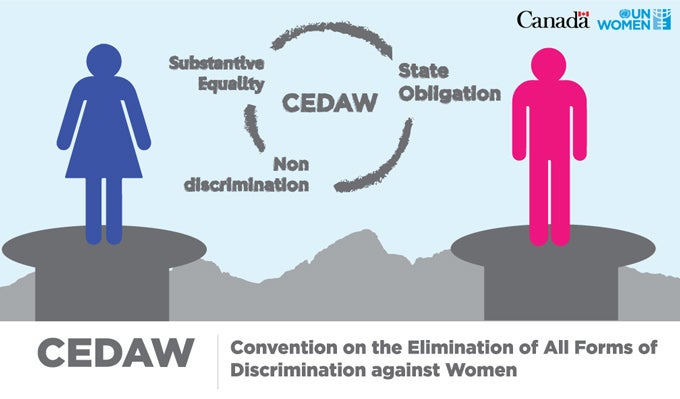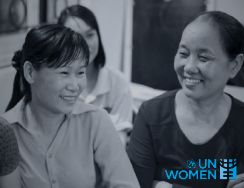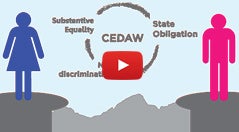CEDAW & Women's Human Rights

The realization of women’s human rights is at the centre of UN Women’s work. UN Women is the UN organization dedicated to gender equality and the empowerment of women. A global champion for women and girls, UN Women was established to accelerate progress on meeting their needs worldwide.
UN Women supports UN Member States as they set global standards for achieving gender equality, and works with governments and civil society to design laws, policies, programmes and services needed to implement these standards. It stands behind women’s equal participation in all aspects of life, focusing on five priority areas: increasing women’s leadership and participation; ending violence against women; engaging women in all aspects of peace and security processes; enhancing women’s economic empowerment; and making gender equality central to national development planning and budgeting. UN Women also coordinates and promotes the UN system’s work in advancing gender equality.
Constraints on fundamental freedoms are daily realities for many women in the Asia Pacific region. Educational and economic disparities between men and women, inadequate female representation in politics and public life, a lack of understanding of women’s human rights by law enforcement and judiciary, and the continuation of harmful practices against women in the name of culture and religion legitimise violations of women’s human rights, which perpetuate gender inequality.
All governments in the Southeast Asia region have made a commitment to advance women’s human rights and remove discrimination against women through the ratification or accession to the Convention on the Elimination of All Forms of Discrimination against Women (CEDAW), while countries such as Cambodia, the Philippines, Thailand, and Timor Leste have also progressed in ratifying or acceding the Optional Protocol to CEDAW.
CEDAW is one of the core international human rights treaties of the United Nations treaty system and is often referred to as the women’s bill of rights. CEDAW was adopted by the UN General Assembly on December 19, 1979, coming into force as a treaty on December 3, 1981. It is one of the most broadly endorsed human rights treaties as of April 2014, having been ratified or acceded by 188 countries, while 104 countries have ratified or acceded the Optional Protocol. By signing onto the Convention, governments in the Southeast Asia region have pledged to undertake legal obligations to respect, protect, and fulfill human rights of women.
Across the region, existing laws have been amended, or new laws have been enacted on domestic violence, sexual harassment and rape, and anti-trafficking. Many Southeast Asian governments are also committed to mainstreaming gender equality perspectives in national, economic and social planning, and allocating resources to develop national action plans focused on anti-discrimination and women’s empowerment.
However, obstacles undoubtedly remain. Clarity is still lacking in many countries on the role of CEDAW in advancing women’s human rights. Many laws and policies do not conform to CEDAW standards for gender equality, and many, while seemingly focused on the advancement of women, fall short of their objectives because of poor enforcement, limited capacity, and weak accountability. Furthermore, many women do not understand what their rights are, and how to claim and exercise them.
To assist in the implementation of CEDAW across the regions, with the collaboration of UN Women and the generous support of the Department of Foreign Affairs, Trade and Development Canada (DFATD), two regional programmes are currently in place to strengthen the implementation of CEDAW in Southeast Asia:
- The CEDAW South East Asia Programme (CEDAW SEAP): Facilitating CEDAW implementation towards the realisation of women’s human rights in South East Asia; and
- Regional Mechanisms to Protect the Human Rights of Women and Girls to Southeast Asia
Both programmes engage with countries in Southeast Asia, namely Cambodia, Indonesia, Lao PDR, Myanmar, the Philippines, Thailand, Timor Leste and Viet Nam; as well as with the ten member states of the Association of Southeast Asian Nations (ASEAN), to facilitate in strengthening capacity awareness of CEDAW and contributing to effective implementation strategies across the region, as well as in national policies.
Supported by:
At a glance

Getting to know more about CEDAW and the Regional Programme in Southeast Asia | CEDAW Brochure
Latest news
Featured Video

With the support of the Canadian Government through DFATD, this video explains the principle of Non Discrimination (now available in English/Thai/Vietnamese). More